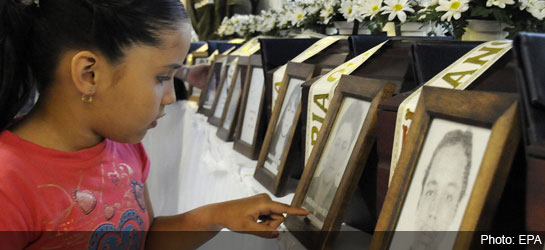
Colombia stays on the Inter-American Commission on Human Rights’ “blacklist,” because of ongoing violence by illegal armed groups and the country’s inability to bring perpetrators of human rights violations to justice, the OAS body said Monday.
“Illegal armed groups continue to be involved in acts of violence against the population, peoples and persons historically discriminated or that have been subjected to vulnerable situations, such as women, human rights defenders and children,” said the annual report from the IACHR, an arm of the Organization of American States (OAS).
OAS members will come together this weekend for the Summit of the Americas, at which Obama is expected to state Colombia has met Free Trade Agreement (FTA) requirements to improve protection for workers and unionists, who have suffered decades of appalling violence. The appearance of Colombia on the IACHR blacklist, which refers to countries which require “special attention” with regards to human rights abuses, suggests otherwise.
It is the 12th year in a row Colombia has appeared on the list. Venezuela, Cuba and Honduras are other Latin American countries included.
“The IACHR continues to receive complaints regarding the use of the military jurisdiction in situations involving human rights violations, and six years after the enactment of the Law on Justice and Peace, only one final judgment has been handed down,” the report states.
The organization also lamented the small number of convictions handed out by Colombia’s court for extrajudicial killings of civilians “allegedly by members of the security forces,” in a scandal known as “false positives.” The term denotes the reporting of murdered civilians as guerrillas killed in combat, in order to artificially boost the army’s kill rate.
It also regretted the “serious problem of internal displacement.” The last United Nations estimate put Colombia’s internally displaced popluation at 3.67 million, the highest number in the world.
The IACHR did acknowledge the progress Colombia had made on human rights. “The Commission recognizes the State’s efforts to dismantle the armed structure of the United Self-Defense Forces of Colombia (Autodefensas Unidas de Colombia),” the report said, referring to the country’s ongoing attempts to demobilize organizations associated with the now-defunct paramilitary group the AUC. But the IACHR said it remained concerned by “pockets of non-demobilized paramilitary structures.”
“The report also notes that Colombia has carried out a series of legislative, administrative, and judicial measures to try to overcome the grave situations involving human rights violations, stemming from paramilitarism and illegal intelligence activities,” the report continued.
Also praised was the June 2011 Land Restitution Act, which pledges to restore land to Colombia’s millions of illegally displaced people.
In April 2011, the U.S. Congress and the government of Colombia agreed upon a comprehensive Action Plan that would include “major, swift and concrete steps” for the national authorities to take before the FTA could go ahead. The main concerns surrounded the exploitation of workers and the safety of trade unionists, who have long been a target of violence for illegal armed groups.
Obama’s announcement will signal U.S. concerns have now been assuaged and the agreement, which will eliminate eliminate tariffs and boost trade between the two countries, can be finalized. However dozens of trade unionists were killed in 2011 — the government says 30, unions say 51 — and four have been killed this year, according to the National School of Labor, a Colombian trade union.


